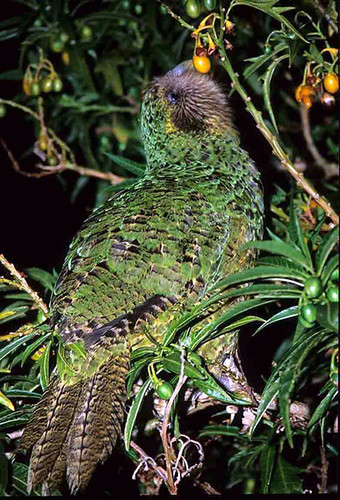 Super sniffer. A well-developed sense of smell may help the nocturnal kakapo find food in the dark. Photo:Don MertonHawks are famous for their sharp vision, and owls are renowned for their keen hearing, but birds rarely get much credit for their sense of smell. That may change thanks to the first analysis of olfactory genes in a wide range of avian species. Birds, it turns out, may be better smellers than we thought.
Super sniffer. A well-developed sense of smell may help the nocturnal kakapo find food in the dark. Photo:Don MertonHawks are famous for their sharp vision, and owls are renowned for their keen hearing, but birds rarely get much credit for their sense of smell. That may change thanks to the first analysis of olfactory genes in a wide range of avian species. Birds, it turns out, may be better smellers than we thought.
Researchers interested in bird behavior have tended to focus on their flashy mating displays, melodious songs, and other talents, leaving the avian sense of smell largely unexplored. A handful of studies have hinted that smell does play a role in bird behavior (ScienceNOW, 29 October 2004), but very little is known about the underlying biology.
In the new study, a team led by molecular ecologist Silke Steiger and her graduate adviser Bart Kempenaers at the Max Planck Institute for Ornithology in Starnberg, Germany, searched for smell-related genes in nine species representing seven major branches of the avian family tree. They looked for genes that encode olfactory receptors, which detect odors. Researchers generally assume that animals with a greater variety of receptors have a better sense of smell. Mice, for example, have close to 1000 working olfactory receptor genes, and humans have roughly 400.
By this logic, the most acute sense of smell in Steiger's menagerie belongs to the kakapo, a rare nocturnal parrot indigenous to New Zealand. The team estimates that the kakapo has 667 functional olfactory receptor genes. Another nocturnal New Zealander, the brown kiwi, has about 600 functional receptor genes. Steiger thinks an acute sense of smell may help these birds find food at night. The galah, an Australian cockatoo whose olfactory talents have not been studied, was the laggard of the flock, with an estimated 107 working receptor genes, the researchers reported online 15 July in the Proceedings of the Royal Society B. "The sense of smell in birds may be as good as that of humans, and in some cases, even better," Steiger says. But she cautions that gene number is only a rough guide. More genetic and behavioral studies will be needed to gauge their sense of smell.
"This is molecular confirmation that birds do have a substantial repertoire of olfactory receptors," says Scott Edwards, an evolutionary biologist at Harvard University. Gabrielle Nevitt, a sensory ecologist at the University of California, Davis, adds that the findings complement growing evidence from behavioral studies that many birds use their sense of smell to find food, avoid predators, and select mates.